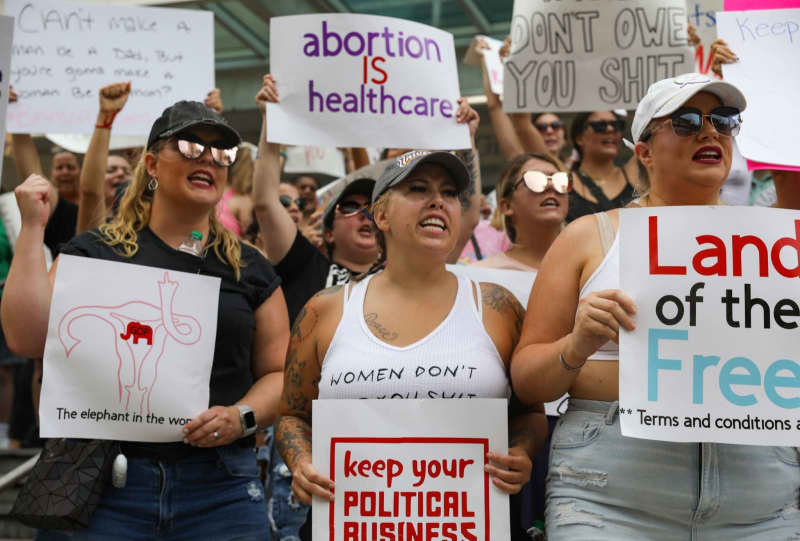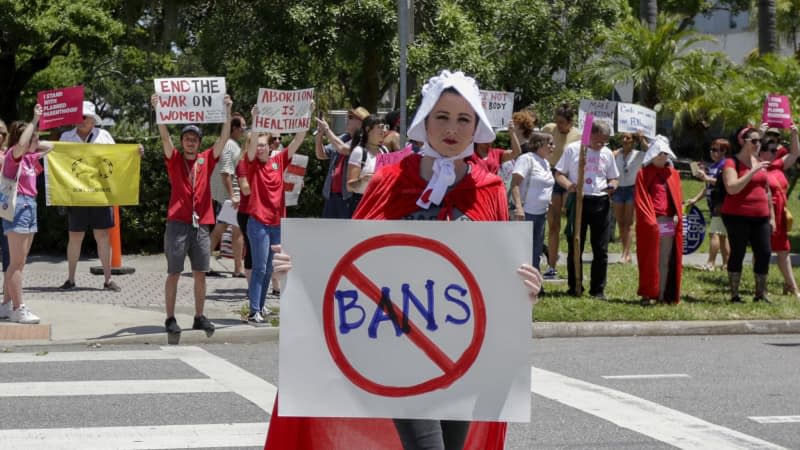Florida clinics to help women travel due to 6-week abortion ban

It’s a nearly 10-hour car drive from Tampa to a Planned Parenthood abortion clinic in Wilmington, North Carolina.
By plane, it’ll take about two hours to fly to the Washington, D.C., area — then another 20 minutes to drive to an abortion provider in Virginia.
It’s a 1,850-mile round trip to get from St. Petersburg to a southern Illinois clinic that offers the surgical procedure.
But Florida women’s clinics and abortion providers say cross-country trips like these to become routine after the state’s Supreme Court ruled to ensure a restrictive abortion ban will take effect at the beginning of May.
The new law will restrict abortions to the first six weeks of pregnancy. Barbara Zdravecky, interim chief executive officer of Planned Parenthood of Southwest and Central Florida, expects many women will arrive at clinics already past that threshold because they did not find out in time that they were pregnant.
Zdravecky held an emergency meeting Tuesday morning with staffers from nine clinics between Naples and Orlando to discuss what they can do to help those women.
“We know we’ll be dealing with very frustrated and upset and scared patients,” Zdravecky said. “This is going to be very overwhelming for them.”
The nonprofit’s clinics are preparing to see as many patients as possible this month before the new law goes into effect. Staffers have been told to encourage patients to schedule appointments as quickly as possible.
For those already past six weeks of pregnancy, centers will help connect patients with organizations that provide financial support to travel out of state for the procedure.
Some groups have already been helping Florida women to get care.
After Florida’s 15-week abortion ban took effect in 2022, the Tampa Bay Abortion Fund, a volunteer organization that raises money to help people access the procedure, mostly paid for women’s appointment costs, not their travel expenses, said McKenna Kelley, a volunteer with the fund.
The fund largely used donations to pay for people’s abortions at Tampa Bay clinics, whether they were local residents or those travelling from other parts of the South, such as Texas, Louisiana or Alabama, Kelley said. The group covered $650,000 in appointment costs last year, helping over 1,900 people.
But the organization expects it will do “a complete 180″ following a Supreme Court decision and will mostly pay for Tampa Bay women’s travel expenses — like plane tickets and hotel rooms — as they seek abortions, Kelley said. It paid $67,000 in travel assistance in 2023, assisting more than 200 people.
Most women don’t know they are pregnant at six weeks, she said, so nearly all callers requesting help will need to leave the state to undergo the procedure.
On average, it costs about $1,100 per person for the travel necessary to receive care outside of Florida, Kelley said.
The fund has already been helping those past 15 weeks pregnant leave the state, often sending them to Washington, D.C., Maryland, Virginia and Illinois, Kelley said. The group chooses locations based on a variety of factors, like whether there are direct flights from Tampa.
Kelley expects the northern states to see an influx of patients after Florida’s six-week ban takes effect. That’s partly because the Sunshine State has become a destination for travellers from across the South who live in areas with even stricter abortion rules.
North Carolina, with a 12-week abortion ban, doesn’t have the capacity to handle the anticipated surge, Kelley said.
“We will be here to help,” said Kelley, who added that the fund has been preparing for Florida’s new ban over the past year. But, she said, it will require “a lot of community support.”
The group saw donations dip from $755,000 in 2022 to $272,000 last year, according to the organization’s annual report. Meanwhile, the number of callers nearly doubled, rising from about 1,760 the year Roe v. Wade was overturned to just under 3,390 in 2023.
Even with assistance to get terminations elsewhere, Florida’s new abortion law will put women’s lives at risk, said Jennifer Griffin, a Tampa physician who provides abortions.
Complications like ectopic pregnancies, where the fetus develops outside the uterus, are not typically detected in the early stages of pregnancy. Florida’s ban does include exceptions for the health of the mother but some women have been refused treatment because Florida hospitals were concerned about performing terminations after 15 weeks.
Florida has a long-established law allowing abortions when a fetus has fatal abnormalities. But no exceptions exist for serious genetic defects, deformities or abnormalities, which were cited as the reason for 141 abortions last year.
“This severely limits the number of women we can help,” Griffin said. “We have people with no medical training trying to tell us how to do our jobs — women are going to die because of that.”
Oviedo mother Danielle Tallafuss was almost 21 weeks pregnant in 2020 and looking forward to adding another child to her family when an anatomy scan showed her unborn son had hypoplastic left heart syndrome. The rare heart defect would likely mean his heart would remain severely underdeveloped with no guarantee he would survive.
She agonized over the decision but decided the right thing for her family was to get an abortion.
“A six-week ban would have been absolutely devastating in my case,” she said at a news event after the abortion ruling was released Monday, adding that she would have travelled out of state for the procedure.
While Florida’s new law is expected to drastically reduce the number of terminations, some anti-abortion advocates push for further restrictions.
Florida Preborn Rescue, a Tampa Bay area nonprofit that sued the city of Clearwater last year over its buffer zone around an abortion clinic, supports a total ban with no exceptions for pregnancies caused by rape or incest, but “short of that, we’ll take all the progress we can,” said president Scott Mahurin.
Mahurin said he hopes abortion providers shut down because of the six-week ban, but if they don’t, his organization — which has 10 to 20 volunteers — won’t stop talking to women outside clinics.
“We’re going to keep doing what we’re doing,” Mahurin said.


